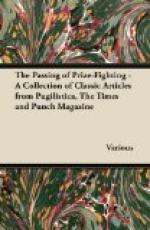No. II.
Some scorn for the faddists who ask us
to hug,
Not with ropes but with pity, the pestilent
Thug,
And some sense (of which Fate, it would
seem, says he shall lack,)
Of the value of logic would much improve
TALLACK.
* * * * *
Another Strike threatened.—The advent of the brother of the reigning King of Siam threatens to cause embarrassment in some English houses where his highness might expect to be received. JEAMES has positively declined to throw open a door and announce, “Prince DAMRONG!” “Such langwidge,” he says, “is unbecoming and beneath Me—leastways unless it is remembered in the wages.”
* * * * *
Why should Merit wait?
We have reason to believe that Sir Henry Edwards, whose stone image adorns a thoroughfare in Weymouth, will not long be left in sole possession of the honour of having a monument dedicated to him in his lifetime. In view of an interesting event pending in his family, it is proposed that a statue shall be erected to Sir Samuel Wilson, M.P., in the grounds at Hughenden. The project has so far advanced that the inscription has been drafted, and we are pleased to be able to quote it:—
To Perpetuate the Memory of Sir Samuel Wilson, Kt., A good Husband, a kind Father, A great Sheep-Farmer. Twice elected to the Legislative Assembly of Victoria, He once sat for the borough of Portsmouth. He built Wilson Hall for Melbourne University, And bought Hughenden Manor for Himself. He introduced Salmon into Australian Waters, And married his Eldest Son To the Sixth Daughter of the Duchess of Marlborough.
Of such is the Colony of Victoria.
* * * * *
Our booking-office.
“Dear Miss Dollie Radford,” writes the Assistant-Reader, “I trust I am right in the feminine and unconjugal prefix; but, be that as it may, I wish simply to tell you that, at the instigation of a lettered friend, I have spent a few moments very wisely in reading your thin little book of verse, A Light Load. (ELKIN MATHEWS.) I feel now as if I had been gently drifting down a smooth broad river under the moonlight, when all nature is quiet. I don’t quite know why I feel like that, but I fancy it must be on account of some serene and peaceful quality in your poems. Here, then, there are sixty-four little pages of restfulness for those whose minds are troubled. You don’t plunge into the deep of metaphysics and churn it into a foam, but you perch on your little bough and pipe sweetly of gorse and heather and wide meadows and brightly-flashing insects; you sing softly as when, in your own words—
“—gently this evening
the ripples break
On the pebbles beneath the
trees,
With a music as low as the full leaves
make,
When they stir in some soft
sea-breeze.”




